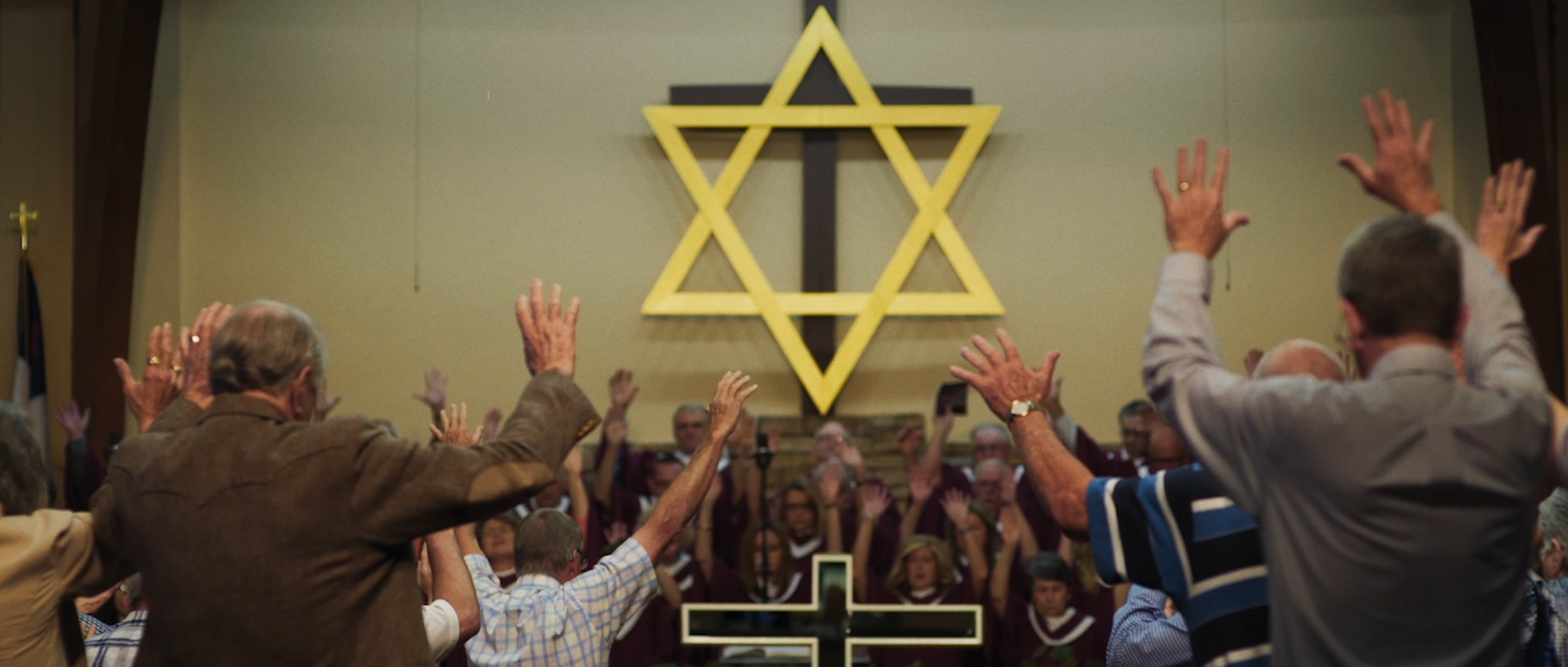|
|
||
|
Pro Tools
FILMFESTIVALS | 24/7 world wide coverageWelcome ! Enjoy the best of both worlds: Film & Festival News, exploring the best of the film festivals community. Launched in 1995, relentlessly connecting films to festivals, documenting and promoting festivals worldwide. Working on an upgrade soon. For collaboration, editorial contributions, or publicity, please send us an email here. User login |
New York: The Other Israel Film Festival 2020
The Carole Zabar Center for Film at the Marlene Meyerson JCC Manhattan Center on the City’s upper west side has been instrumental in establishing the Israel Film Center (IFC) streaming platform. Several annual issue oriented film festivals at the JCC Center are now programmed online and IFC has used an innovative and unique approach to promoting Israeli culture in the United States. IFC provides a significant contribution to better understanding of the contemporary problems faced by the residents of Israel and of other significant conflict areas. IFC’s streaming platform offers many productions produced or co-produced by 32 countries which incorporate several films and documentaries from its four film festivals. Israel is identified as the source of 15 films. Due to the shift to virtual formats because of the pandemic, the number of views on demand renters has increased for the film festival, but the streaming library of IFC’s streaming platform has also been growing year over year. The online library is a collection of award-winning films and television productions. Viewers must pay $13.00 for one rental. Related festival discussions and events are also programmed on the IFC YouTube channels and are thus accessible to the general public. Since the streaming site and the festival is financed by the Center for Film with an essential role by its funder Carole Zabar, there is no dependence on corporate financial sponsorship and programming of the steaming site and the festivals retains its political and cultural independence. The annual film festivals include Cinematters: NY Social Justice Film Festival, programmed in January with productions premised in involving the audience to pursue a more democratic and just society. The ReelAbilities Film Festival also held in January is the largest global disability focused film festival. The Israel Film Center Festival held in June is the biggest Israeli film festival in the New York metropolitan area. As its title reflects, the Other Israel Film Festival, which just concluded in November, provides an updated critical analysis throughout its program. Q&A’s and panels addressed the contemporary and past issues faced by Israel. It covers all groups living with a special emphasis on the Palestinian Israeli conflict, but was also enriched in this year’s edition with documentaries on the singular role the still powerful AIPAC pro-Israel lobby and US fundamental evangelicals have on Israel’s current government. As with most other large and niche film festivals, the Other Israel Film Festival (OIFF) chose an online format. There were no problems securing productions for the online format and compensations were paid to the rights holders. Fewer films were considered for the 2020 edition and the pool of more than 150 titles considered, 3 feature films, 11 documentaries and 12 short films were selected. The OIFF sold more than in prior OIFF editions and considerably more full festival passes were purchased. Like most online film festivals, the OIFF audience grew. Costs for the festival were slightly comparable to the 2019 edition and the biggest challenge in shifting to an online format was synchronizing the conversations and panels with the audience viewership. What makes the Other Israel Film Festival and others arranged by the Carole Zabar Center for Film so significant is its emphasis on audience involvement in the issues and problems presented. This is a characteristic I have not encountered in other small or large festivals that I have reviewed over the last decades. The Center for film prepared the New Israel Fund Action Guide for its audience, an updated guide to reinforce the quest for pluralistic equality and human rights. The action guide sought to establish connections with the movements and activists which are involved in the matters presented and suggest possible solutions for the issues and conflicts presented. Thus we learn with respect to the films discussed here about Telos organizing visits to Israel and the occupied areas, the DC based J Street lobby as an alternatives to AIPAC the conservative pro-Israel lobby, Americans for Peace Now, the Tag Meir – Light Tag Forum, and IRAC – the Israel Religion Action Center as well as gaining knowledge about Israel based volunteer groups supporting conscientious objection to army service.
‘TIL KINGDOM COME, Maya Zinshtein, 2020; Israel, UK, Norway For most people living in the USA outside the religious realm and probably also many residents of Israelis it will come as a surprise that millions of American evangelicals pray for the survival of Israel and donate large amounts of money for charitable projects in that country as well as support for Jews who plan to migrate there. This is justified by evangelical believers following selective scripture readings stating that the second coming of Christ in Israel will culminate in a bloody Armageddon that leaves space for the true evangelicals and those converting to their faith, but no room for Jews who will perish. This documentary provides a case study of members of an impoverished Kentucky evangelical congregation in a coal mining town and their fervent financial support for the International Fellowship of Christians and Jews (IFCJ set up by the Bingham family). Zinshtein shows a clear working relation between the power of the evangelical voting block and conservative politicians. 80% of this group voted for Donald Trump in the recent presidential election. They were essential in supporting his fateful decision of openly backing the Israel annexation of more Palestinian lands, of moving the US embassy to Jerusalem, and providing unequivocal support to Israel requests from the US. This was part of their backing of Trump’s domestic agenda ranging from abortion legislation to the appointment of conservative judges. Though IFCJ has been criticized by US and Israeli groups for their fundraising objectives and messianic message that there is no room for Jews [or Palestinians] once Jesus is in Israel and the final battle is over, IFCI enjoys the support of the current Israeli government. Realpolitik rather than normative consideration prevail. Thus far the strategic coalition between Trump, Netanyahu, and American evangelicals persists; and the heritage it leaves for President Elect Joe Biden.
THE PROPHET, Ilan Rubin, Field, 2019 Rabbi Meir Kahane left a firm imprint on Israel’s political development with his refusal of democratic processes, dogmatic understanding of Zionism, and rejection of anyone not Jewish living in Israel. These views were articulated by him and a small number of followers before his Kach party was forced out of the Knesset, the Israeli parliament, in 1998 because it was advocating racism and violence. These perceptions are now shared by a larger number of his followers and some politicians. After all, there is current legislation stipulating that Israel is a Jewish state and Arabic no longer an official language. The shift to an autocratic mode of government, some restrictions of civil liberties, the praxis of annexing Palestinian lands and an occupying army all reflect ideas which Kahane exhorted decades ago. Today Kahane’s ideology has entered the political discourse. When he served in the Knesset in 1994 as the sole representative of the Kach party he made it abundantly clear that Zionism cannot be reconciled with western democracy. He introduced legislation to change Israel’s name to Judea which was recently modified as “Israel is the national State of the Jewish People”, to force all non-Jews to leave Israel unless they convert, to penalize sexual encounters between Jews and Arabs and to outlaw beaches shared by Jews and Arabs. At one point he spelled out his belief that it is Jews blood which makes them superior. The Knesset offered Kahane a convenient platform to publicly convey his Israeli Nazi ideology. He deserves merit for opening debate in the United States and politizising the persecution of Jews in Russia and facilitating their exit to Israel by organizing the Jewish Defense League in the late sixties and holding aggressive demonstrations. However, his contribution to the nationalistic right-wing shift in Israel and embrace of violence as a political tool should not be minimized. Recall that Baruch Goldstein, who killed 29 Muslim worshipers on February 25, 1994 in Hebron and was beaten to death the same day by survivors of the massacre. He was a devotee of Kahane and a leading Kach member nominated for the Knesset.
OBJECTOR, Molly Stuart, 2019 This persuasive documentary traces the story of the 19 year old Atalya born and raised in Israel in the context of a society where service in the army is considered not only an obligation but an honor, children learn in school from the youngest age on to respect and admire the armed forces, and where in most families other members have served. In Atalya’s family both her parents and grandparents had served and fought as officers. Not servings is considered as socially shameful. Except for cases of armed conflict and areas occupied by settlers, few Israelis have direct exposure to Palestinians in the occupied areas. They gain limited knowledge through media and their educational settings. The mandatory military service for all Israelis still stands and creates an overarching presence of the armed forces in Israeli society. As some younger ones say, they cannot imagine their country without the army and an implicit state of war. In addition, what makes Atalya’s situation more complicated is that members of her generation have no direct military experience. Unsure about her decision about conscription, Atalya discusses her doubts with her older brother who did not serve on medical grounds, and her family members who do not understand why she is wavering. She learns from some friends in the army that they have adjusted their moral qualms and cannot perceive their service as part of an occupation. What has a greater impact for her is visiting Palestinian settlements and confronting a new reality, the experience of individual Palestinians. This ranges from the physical destruction of their homes by the army, oppression by the settlers who have taken their lands, close collaboration between settlers and the army, and constant harassment of Palestinians by the Israeli authorities. What their children learn from it is hate for the Israelis. The lesson for Atalya differs, that violence cannot be stopped by violence, that the armed forces do not primarily serve as peacekeepers but as an occupation force, and that Israel is on the road to apartheid as a system. During the day of her conscription at Camp Dor there are conscientious objectors, mostly women, supporting her, but also crowd of young people screaming “traitor” and hurling insults at her. She refuses to become a soldier and is placed in military jail because her application to get the status of conscientious objector was rejected. The committee disqualifying her, which was named Mazpoon, or Moral Compass, did not accept her arguments. Her arguments stressed the need for analyzing the causes of terrorism and studying the consequences of Israel and the army acting as an occupying power. Atalya is imprisoned for several months but in a second army review she is declared to be incompetent to serve on behavioral grounds. Her courageous actions shape the perspective of her friends and parents. Her father stays ambivalent, but her mother also considers the army an occupying force.
KINGS OF CAPITOL HILL, Mor Loushy, Israel, 2020* Loushy provides a stimulating investigation of Israel’s rise to power, dominating Washington relevant federal policies thus far. In his detailed case study of the most important pro-Israel lobby, the American Israel Public Affairs Committee (AIPAC) the attentive audience gets a clear understanding about the Washington DC lobbying process and how AIPAC had been instrumental in shaping US policies. AIPAC was established in 1951 to generate a better understanding of Israel, provide support for the peace process and receive backing because the six-day war including funds from federal agencies. AIPAC was financed by contributions from wealthy American liberal democratic Jews who shared the vision of the founding members and the mission they articulated. The documentary is based on archival material but at its core are the interviews carried out by Loushy with former executives and supporters of the lobby. AIPAC has never granted any interviews during the 70 years of its existence, keeping its mode of operation and pressure politics off limits. Thus, for outsiders and many Israelis, before Loushy’s outstanding investigative documentary, AIPAC remained a fairly obscure organization. Loushy shows how AIPAC morphed from a liberal democratic lobby articulating or backing possible solutions to the Palestine Israel problem and securing financial support for Israel into a conservative organization firmly behind the current Israeli government and its policies of expanding control over Palestinians lands and restricting civil liberties for Palestinian. Whereas there was no fissure during the early decades of AIPAC between the positions it held and the views of the Jewish American population, today there is a large discrepancy between AIPAC’s complete solidarity with Netanyahu and the socio-political perspectives of the Jewish community in the UJS. The gap is illustrated by the recent presidential elections. About 80% of Jewish voters opted for Biden and the percentage of Jews selecting the Republican party reached the lowest level ever since 2008. As the documentary shows, the transformation of AIPAC has been expressed in various ways. This lobby is now considered to be one of the most powerful in Washington DC. It was successful in undermining the electoral process by throwing its resources and weight behind candidates with unquestioned allegiance to Israel. It backed directly or indirectly and provided support to any opponent to an elected member who criticized support for Israel or questioned her policies. The most prominent of the numerous victims of AIPAC was Senator Charles Percy who had served for 18 years in the Senate and frequently questioned the generous US military aid for Israel. He was replaced by the relatively unknown Paul Simon with strong backing from AIPAC. The defeat of Percy and others placed a damper on any criticism of Israel by members of the Senate and House. Thus, a seemingly Congressional support consensus for Israel arose and the view that such support meets the national US interest. Parallel to the subversion of elections was the open and covert resistance and opposition to peace initiatives like the Oslo Accords or any financial support for Palestinians. Evidently any modification of the position of the Israeli government and Trump to the 2014 Iran agreements was vigorously opposed. During the last decades, most executives and staff members of AIPAC with democratic or liberal leanings were terminated and any critical discussion of Israel made impossible. As stated by a former executive, “AIPAC is as interested in peace as Dracula is in a Bar Mitzva”. But AIPAC, though married to Netanyahu for as long as he is in power, is no longer the sole voice on the hill speaking for Israel. Since 2008 the J-Street lobby has been offering critical and liberal alternatives to the unquestioned support of Israel. Its adherents, specifically the younger generation have participated in anti-AIPAC manifestations. Also important is the fact that not a single democratic candidate running for office attended the last AIPAC convention. Nevertheless, changes of US Israel policies are difficult but not impossible to attain given the facts established by Donald Trump and Netanyahu. But Biden is still willing to discuss the 2014 Iran agreement. *This review was first published on November 11, 2020 in my filmfestivals.com article about the NYC DOC festival.
Claus Mueller New York filmexchange@gmail.com
22.12.2020 | Claus Mueller's blog Cat. : AIPAC American evangelicals Conscientious objection Israel army Israel's right wing Meir Kahane Molly Stuart Pro-Israel US lobby Woman refusing to serve
|
LinksThe Bulletin Board > The Bulletin Board Blog Following News Interview with EFM (Berlin) Director
Interview with IFTA Chairman (AFM)
Interview with Cannes Marche du Film Director
Filmfestivals.com dailies live coverage from > Live from India
Useful links for the indies: > Big files transfer
+ SUBSCRIBE to the weekly Newsletter Deals+ Special offers and discounts from filmfestivals.com Selected fun offers
> Bonus Casino
About Claus MuellerThe EditorUser contributions |




























